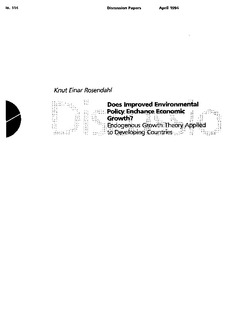| dc.contributor.author | Rosendahl, Knut Einar | |
| dc.date.accessioned | 2012-03-08T21:32:36Z | |
| dc.date.available | 2012-03-08T21:32:36Z | |
| dc.date.issued | 1994 | |
| dc.identifier.issn | 1892-753x | |
| dc.identifier.uri | http://hdl.handle.net/11250/180883 | |
| dc.description.abstract | The environmental impacts on an economy is studied over time using endogenous growth theory. Externalities from the environment on production are central in the analysis, and we examine whether an optimal path realizes more rapid economic growth. The paper is mainly focusing on developing countries, where production is largely influenced by the environmental quality. The result of the analysis indicates that the economic growth rate does not depend on the internalization of the environmental externality, but rather on the internalization of the human capital externality. The level of economic activity does, however, generally depend on the internalization of both externalities. | no_NO |
| dc.language.iso | eng | no_NO |
| dc.publisher | Statistics Norway, Research Department | no_NO |
| dc.relation.ispartofseries | Discussion Papers;No. 114 | |
| dc.subject | Environmental policy | no_NO |
| dc.subject | Economic growth | no_NO |
| dc.subject | Endogenous growth theory | no_NO |
| dc.subject | Developing countries | no_NO |
| dc.subject | JEL classification: O13 | no_NO |
| dc.subject | JEL classification: O40 | no_NO |
| dc.subject | JEL classification: Q20 | no_NO |
| dc.title | Does improved environmental policy enhance economic growth? endogenous growth theory applied to developing countries | no_NO |
| dc.type | Working paper | no_NO |
| dc.subject.nsi | VDP::Social science: 200::Economics: 210::Economics: 212 | no_NO |
| dc.source.pagenumber | 23 s. | no_NO |
